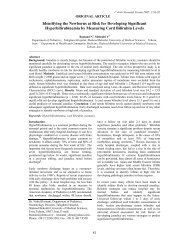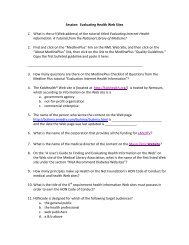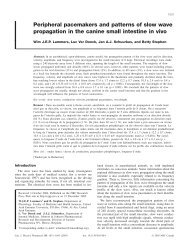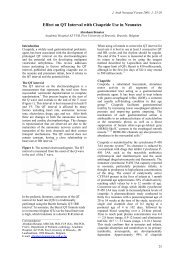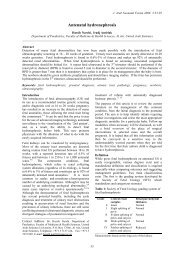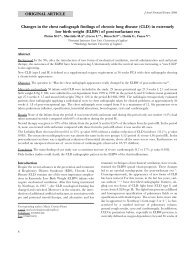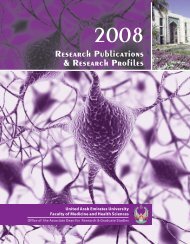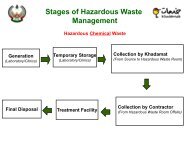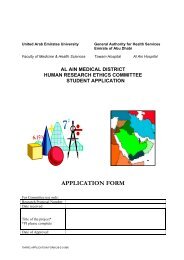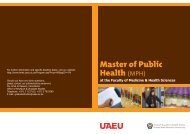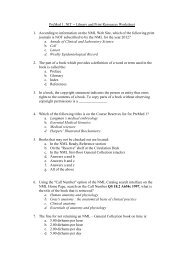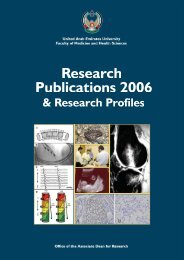Community Medicine Abstracts - College of Medicine and Health ...
Community Medicine Abstracts - College of Medicine and Health ...
Community Medicine Abstracts - College of Medicine and Health ...
You also want an ePaper? Increase the reach of your titles
YUMPU automatically turns print PDFs into web optimized ePapers that Google loves.
Project No. 192 (B-2002/3)What Do Patients in Primary <strong>Health</strong> Care Expect from their PhysicianEncounter?Student Authors: Jihan Abdullah Moh'd R. Al-Shehhi, Huda Saeed obaid Moh'dSubait, Fatima Ahmed Moh'd Abdulla FikriFaculty Supervisors: Dr. A. Carter, Dr. M.M. HossainAbstract:Objectives The study aimed at exploring patients' expectations from their physicianencounter in Primary <strong>Health</strong> Care in Al Ain city, UAE. The main objectives were toaddress patients' expectations prior to consultation, how well they are met, <strong>and</strong> toevaluate the overall satisfaction.Methods The study was an analytic prospective study, conducted in the period from 26October to 26 November 2002, in five Primary <strong>Health</strong> Care Centres, which werer<strong>and</strong>omly selected. A self-administered questionnaire consisting <strong>of</strong> two parts was usedfor data collection. Data analysis was done using SPSS.Results Analysis <strong>of</strong> the study showed that the most wanted <strong>and</strong> expected items priorto the consultation were: 'want doctor to underst<strong>and</strong> the problem' (91.1 %), ‘want toreceive comfort' (94.4%), 'want to be examined' (93.3%), 'want to receiveprescription' (92.1 %), <strong>and</strong> 'want to be advised about medical treatment' (91.1 %).The least expected item was 'want to discuss certain life problems' (9.1 %). About 78% <strong>of</strong> participants had received 50% or more <strong>of</strong> their expected items. It was alsoshown that there was a statistically significant impact <strong>of</strong> the duration <strong>of</strong> theconsultation <strong>and</strong> meeting patients' expectations (P =0.042). In addition, there was astatistically significant association between patient's satisfaction <strong>and</strong> meeting theirexpectations (P = 0.007)Conclusions In summary, our findings indicate that Primary Nocturnal Enuresis is acommon problem among primary school children in Al Ain education zone. There weremany management strategies which were reported by parents but the most effectivewas emptying the bladder before going to bed. The most common causes <strong>of</strong> PNE fromparent's view were drinking plenty <strong>of</strong> fluids, not emptying the bladder before going tobed, cold weather <strong>and</strong> genetic factors. A majority (77.8%) <strong>of</strong> parents reportedimprovement in PNE <strong>and</strong> 88% were satisfied with the management <strong>of</strong> their child'sPNE. The establishment <strong>of</strong> a screening program in Al Ain for PNE, in combination witheducation <strong>of</strong> parents, school staff <strong>and</strong> health pr<strong>of</strong>essionals concerning the diagnosis<strong>and</strong> management <strong>of</strong> PNE, has the potential to lead to increased detection <strong>and</strong>improved management <strong>of</strong> PNE amongst school aged children in UAE. Finally, it mightbe beneficial if appropriate guidelines were developed for both diagnosis <strong>and</strong>management <strong>of</strong> PNE, for use by Paediatricians, Primary <strong>Health</strong> Care clinic doctors <strong>and</strong>School <strong>Health</strong> doctors.



